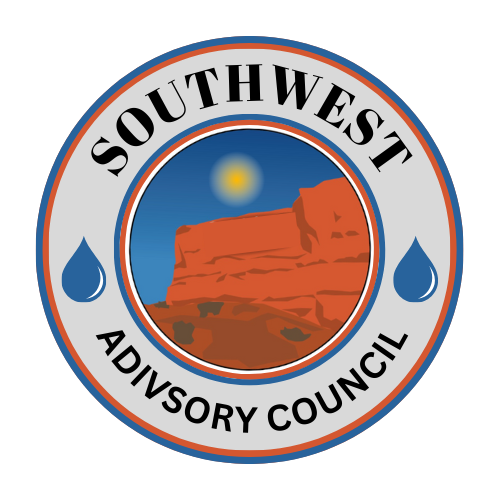Southwest Advisory Council

The Southwest Advisory Council (SW AC) is composed of 7 members representing various perspectives from Washington and Kane Counties. Members of the SW AC represent diverse backgrounds and viewpoints from the region, including some with a state or local government background. Others represent the energy and agricultural industries. Other members work with water districts, academia, or advocacy organizations. We are grateful for the opportunity to present to the Board a few recommendations that have emerged from our conversations this past year.
Co-Chair: Adam Snow – Adam is a Commissioner for Washington County. His family was one of the first to settle Washington County, and Snow Canyon is named for his 3rd great-grandfather. For almost 6 years, Adam has been the Southern Utah Director for Congressman Chris Stewart, working for the citizens of southern Utah. He is an active member of the GOP, and currently serves on the State Central Committee and State Executive Committee. Adam has served as a county delegate, precinct chair, state delegate, and campaigned for conservatives across the Southwest. Adam earned his M.B.A. from Pepperdine University, an M.D.R. (ie: Master of Negotiation) from Pepperdine School of Law, and a Bachelor’s from the University of Arizona.
Brock Belnap - Brock is the Associate General Manager for the Washington County Water Conservancy District. Brock previously served as the County Attorney for Washington County for 16 years. He earned his associate degree from Dixie College, a BA from the University of Utah, and went on to BYU where he earned his JD in 1992. Brock lives with his family in St. George.
Elaine York – Elaine is the West Desert Regional Director for The Nature Conservancy and has over 25 years of experience in leading collaborative projects to support and improve Utah’s natural areas, both terrestrial and aquatic. She has extensive experience in partner engagement, strategic planning, fundraising, and natural system enhancement projects all in a collaborative context with federal, state, and local partners as well as ranchers and agricultural producers. Elaine has a BS in Anthropology and MS in Education from the University of Utah.
Edward Andrechak - Edward has 35 years of experience in engineering, account management, and business development. He currently serves as the Vice President of Water Program Director for Conserve Southwest Utah (CSU) where he leads their Water Program. As a Board member of CSU, Edward also is directly involved in organizational strategic planning and tactical administration. Edward earned his MBA from UCLA and his BS in Chemical Engineering from Virginia Tech and currently lives in Ivins.
Stacy Young- Stacy has been a developer and land use attorney for over 20 years. In that time, he has been directly involved in developing thousands of homes and related commercial and civic uses in Washington County and is also the public policy director for the Southern Utah Home Builders Association. Before becoming a developer, Stacy was a management consultant for a boutique consultancy based in Las Vegas. His hobbies include trail running and cycling in beautiful southern Utah. He has a bachelor’s degree from the University of Utah and a JD and MBA from Washington University in St. Louis.
Shanandoah Anderson- Shanan is a tribal member of the Shivwits Band of Paiutes. She is the current Tribal Liaison for the Shivwits Band on Water Rights and all issues concerning the Upper, and Lower Colorado River. Shanandoah also works as a tribal monitor for the Southern Paiute Consortium (SPC) to ensure the protection of cultural resources along the Colorado River as well as a member of the Culture Committee and Emergency Management for the Shivwits Band. She is a personal Cultural Consultant on the history and culture of the Southern Paiute people located in Utah, Nevada, Arizona, and California and does speaking engagements and consulting for schools, government, state agencies, tribes, television series such as Netflix, documentaries, authors and a variety of private entities.
2026 RECOMMENDATIONS TO THE BOARD
The Southwestern advisory council understands the high-stakes, complexity, and critical nature of the Colorado River Negotiations. We would like to use this time to share the core concerns and values of the council that focus on growth, innovation, and local economic protection.
Main Concerns
The Southwest council has three main concerns to keep in mind. First and foremost, to continue the successful water storage and development projects led throughout Washington County and continue to prioritize sustainable use as the county grows. Secondly, to collaborate with universities across Utah to utilize innovative and advanced technologies. We plan to work with Utah State University by staying up to date on the latest academic research and with our local university, Utah Tech, by testing the practical application of diverse water development and storage solutions within the region. Last but not least, protect the multifaceted local economies of Southwestern Utah. The recreation and tourism industries, rural communities, and Tribal nations are most susceptible in the event of a compact call. This isn’t unique to the Southwest but with many at risk groups in our area, we hope that any proposed settlement ensures the future livelihood and stability of our residents and communities.
Closing Statement
This council recognizes the empirical knowledge the board has of Washington county and this council’s efforts. We want to express our appreciation and gratitude to those participating in negotiations for the continued commitment and determination to try to come to a fair agreement. We ask that the Board, River Commissioner, and negotiating team continue working diligently toward a fair settlement that honors the interests, water rights, and long-term stability of Utah and the Southwest region.
